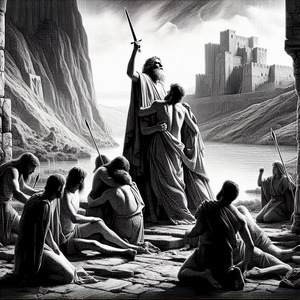| << Previous (Vayetze) | Next (Vayeshev) >> |
The Hebrew Word
The name of this week's parashah is וישׁלח [vayishlach- "and he sent"]. It is a third-person conjugation of the Hebrew verb shalach (Strong's #7971), which is a root word that means "to send out" or "to send forth". The word is used 995 times in 790 verses in the Tanakh.
Examples from Scripture include G-d "sending" Adam out of the Garden of Eden (Genesis 3:23), Noah "sending" a raven (Genesis 8:7) and a dove (Genesis 8:8) out of the ark, and G-d "sending" the angels to destroy Sodom (Genesis 19:13).
The noun form of the word (shelach) means "spear" or "missile"... something that is "sent forth" as an attack.
A Hebrew word that uses shalach as its root is שָלִיחַ [shaliach], which is the Hebrew equivalent of "apostle" and means "one who is sent".
Another form of the word (shiluach) means "a dismissal", especially in terms of a divorce.
First use in Scripture
The first time shalach is used in Scripture is in Genesis 3.
Then the LORD G-d said, "Behold, the man has become like one of Us, knowing good and evil; and now, he might stretch out his hand, and take also from the tree of life, and eat, and live forever" (Genesis 3:22)
Last use in Scripture
The last time shalach is used in Scripture is in Malachi 4.
"Behold, I am going to send you Elijah the prophet before the coming of the great and terrible day of the LORD. He will restore the hearts of the fathers to their children and the hearts of the children to their fathers, so that I will not come and smite the land with a curse." (Malachi 4:5-6)

Parashah Outline
- Jacob prepares to meet Esau - Genesis 32:7
- Jacob wrestles with G-d and is renamed Israel - Genesis 32:24
- Jacob faces Esau - Genesis 33:1
- Jacob settles in Shechem - Genesis 33:18
- Rape of Dinah and slaughter of Shechem - Genesis 34:1
- Jacob settles in Beit-El and is again named Israel - Genesis 35:1,9
- Benjamin is born, and Rachel dies - Genesis 35:16
- Sons of Israel enumerated - Genesis 35:22
- Esau moves and settles in Seir - Genesis 36:8
- Sons of Esau enumerated - Genesis 36:10
Portraits of Messiah
Jacob is returning after an extended absence from the land of Israel. So, too, Messiah will return to the land after an extended absence (John 14:3)
Jacob split his company into two camps. So, too, Messiah has two camps: Jew and Gentile, who are one in Him. (Galatians 3:28)
Jacob sent his company forth ahead of him. So, too, Messiah has sent his followers ahead of him to "make disciples of all nations". (Matthew 28:19-20)
We also see Messiah clearly in the passage when Jacob wrestles with the "angel". In Genesis 32, we find:
"So Jacob named the place Peniel, for he said, "I have seen God face to face, yet my life has been preserved."
Messiah repeatedly states (John 1:18, 5:37, 6:46) that "no one has seen G-d at any time". Yet Jacob names the location of his struggle Peniel [face of G-d]. Who was it Jacob saw? Messiah himself!
Other Observations
A Gentle Answer
The name of this parashah in English is "and he sent". In the parashah, Jacob sends messengers to his brother Esau. He sends them with words of kindness, humility, and supplication. As the son who had the firstborn's rights and the firstborn's blessing, Jacob might have tried to "stand up for his rights" but instead took a position of humility. As it is written:
A gentle answer turns away wrath, But a harsh word stirs up anger. (Proverbs 15:1)
Double camp
In this parashah, we find the first mention o מַֽחֲנַיִם [machanayim - Strong's #4266], which means "double camp":
Jacob said when he saw them, "This is G-d's camp." So he named that place Mahanaim. (Genesis 32:2)
Those who are sent
In almost every example of shalach in Scripture, the one being sent leaves the protection of the sender to perform a specific purpose.
- G-d sends Adam and Eve out of the safety of the garden (Genesis 3:23).
- Noah sends a raven (Genesis 8:7) and a dove (Genesis 8:8) out of the safety of the ark.
- Messiah sends the disciples away from Him to minister to the lost sheep of Israel (Matthew 10:5-42).
Commandments In the Parashah
Two of the traditional 613 commandments are found within the book of Genesis. The first is in parashah Bereshit. The second is in this week's parashah and is the traditional commandment "do not eat the sinew of the thigh" found in Genesis 32:32. The passage does not actually record G-d delivering a commandment. Instead, we find the brief mention of a tradition of the sons of Israel to honor their forefather Jacob by not eating the sinew of the thigh of kosher animals.
This relates back to the story of Jacob wrestling with G-d/angel/man. At the conclusion of the event, Jacob was touched in the socket of his thigh, causing it to be dislocated (Genesis 32:25).
Related Verses In the Torah
Pending
Related Verses In the Prophets
Pending
Related Verses In the Writings
Pending
Related Verses In the Apostolic Writings
Pending
Appendix
790 verses that include shalach (Strong's #7971)
View the list of verses on BlueLetterBible.com
